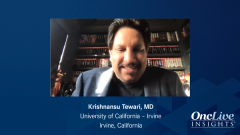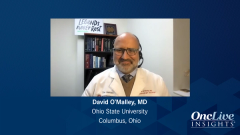
Treatment Options for Advanced Stage Relapsed Endometrial Carcinoma
Physician-researchers discuss the risk of recurrence in endometrial carcinoma and the available treatment options after relapse.
Episodes in this series

Bradley Monk, MD, FACOG, FACS: Krish, tell us about your case. What was the chance of recurrence? You’re probably going to tell us she recurred. What was the probability of that? What did you do?
Krishnansu Tewari, MD: The probability was pretty high; it’s about 60% that this patient with nodal metastases would recur. She did recur and had already been treated with chemotherapy plus carboplatin-paclitaxel. What are the treatment options available for a patient who’s been previously treated for advanced-stage disease who then relapses?
Bradley Monk, MD, FACOG, FACS: The molecular signature matters. Essentially, every second-line patient, including those who got adjuvant therapy like this 1, needs pembrolizumab in the second line. The only question is, do they need lenvatinib when pembrolizumab is not going to work very well?
David O’Malley, MD: Brad, I’ve got to interrupt you. She’s platinum sensitive. She’s recurred 8 months.
Krishnansu Tewari, MD: 8 months. But that doesn’t apply to endometrium, right?
David O’Malley, MD: I’ve got you, Krish. I hate that. There’s no data in 6 months. She’s platinum exposed! Those patients need pembrolizumab, exactly as what Brad said.
Bradley Monk, MD, FACOG, FACS: Dave, what you said—people say that. As much as we think no one ever would, they do. That’s part of the value of this conversation. Dostarlimab was FDA approved on August 17, 2021. We can use pembrolizumab or dostarlimab if the patient is MSI [microsatellite] high or mismatch repair deficient, or theoretically POLE hypermutated, with TMB [tumor mutational burden] opportunity for pembrolizumab. Then everybody gets pembrolizumab-lenvatinib. We’ve had that opportunity for a long time based on the September 2019 accelerated approval. In July it got full approval. You’ve seen the publication in the New England Journal of Medicine that randomized patients, just like this, to chemotherapy vs pembrolizumab-lenvatinib, and it showed a survival advantage that was not only statistically significant but clinically meaningful in this patient.
Transcript edited for clarity.







































